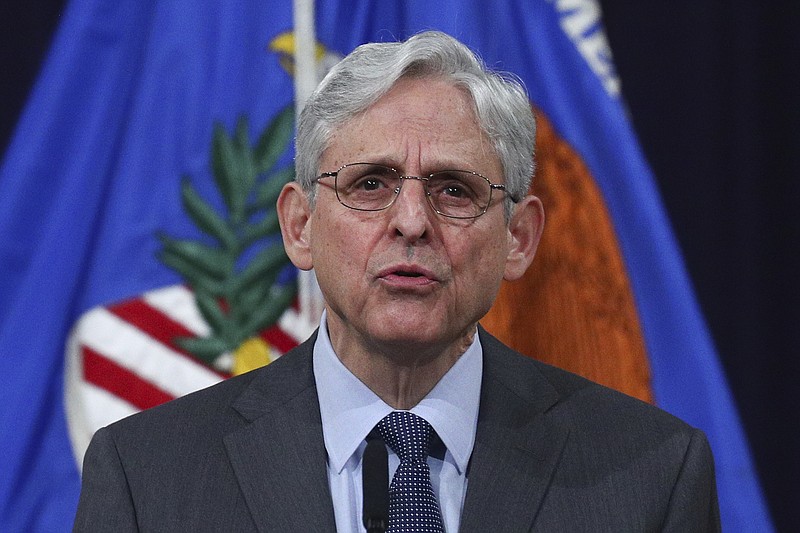WASHINGTON -- U.S. Attorney General Merrick Garland said Monday that the Justice Department would beef up its policies for obtaining lawmakers' records and vowed "strict accountability" for officials who let politics affect their work, issuing a lengthy statement amid a growing controversy over department efforts during the Trump administration to obtain the data of members of Congress, journalists and even the White House counsel.
[Video not showing up above? Click here to watch » https://www.youtube.com/watch?v=EpYhb4JQhjI]
Garland's statement did not say how policies would change, but it noted, "Consistent with our commitment to the rule of law, we must ensure that full weight is accorded to separation-of-powers concerns moving forward."
The attorney general said he had directed his deputy attorney general, Lisa Monaco, to "evaluate and strengthen the department's existing policies and procedures for obtaining records of the Legislative branch," and he noted that she was "already working on surfacing potentially problematic matters deserving high-level review."
"As I stated during my confirmation hearing, political or other improper considerations must play no role in any investigative or prosecutorial decisions," Garland said.
"These principles that have long been held as sacrosanct by the DOJ [Department of Justice] career workforce will be vigorously guarded on my watch, and any failure to live up to them will be met with strict accountability. There are important questions that must be resolved in connection with an effort by the department to obtain records related to Members of Congress and Congressional staff."
In recent weeks, the department has notified current and former Washington Post, CNN and New York Times reporters that their phone and email records had secretly been seized as part of moves that began in the Trump administration.
The moves, which came during efforts to investigate leaks of classified information, sparked outcry from First Amendment advocates and media executives, and President Joe Biden and Garland have since vowed to stop going after reporters' records in such cases. Leaders of the three news organizations met with Garland on Monday to discuss the matter.
Last week, it was revealed that the department had also, in February 2018, subpoenaed Apple for the data of two lawmakers on the House Intelligence Committee -- California Democrats Adam Schiff and Eric Swalwell -- as well as current and former staffers on the panel and family members.
Swalwell and Schiff were frequent critics of the president during the Trump administration's early years, when Democrats were in the minority and Republicans were running the Intelligence Committee's investigation of Russian interference in the 2016 election. Democrats decried the Trump Justice Department's seizure of their records as possibly politically motivated. Those seizures, too, seemed to come during a leak investigation.
On Monday, the head of the Justice Department's National Security Division -- which managed the leak cases -- disclosed he was stepping down from his post by June 25, though the departure had been in the works for some time, a Justice Department official said.
The division head, Assistant Attorney General John Demers, was a Trump appointee who had been held over into the Biden administration.
Over the weekend, it was revealed that Apple had last month notified another prominent political figure that his records were sought by the Justice Department in February 2018: former White House counsel Donald McGahn.
The reason for that seizure remains unclear. The Justice Department has declined to answer specific questions about all of the moves.
The disclosures are forcing Biden administration officials to wade back into a fight with their predecessors -- something they've wished to avoid.
Now the House Intelligence Committee chair, Schiff said Monday that he had spoken with Garland, who had given his commitment to an independent investigation by the inspector general. Schiff said he had "every confidence" that Garland "will also do the kind of top-to-bottom review of the degree to which the department was politicized during the previous administration and take corrective steps."
Meanwhile, Senate Minority Leader Mitch McConnell, R-Ky., lambasted a demand by Democrats that former attorneys general William Barr and Jeff Sessions testify before a committee on the subpoenas, saying his Democratic colleagues had given into the "urge to pick at the scab of politically motivated investigations." He defended Barr, saying the move was a "witch hunt in the making."
"There is no need for a partisan circus here in Congress," he said.
Information for this article was contributed by Matt Zapotosky of The Washington Post; and by Michael Balsamo, Mary Clare Jalonick, Michael Liedtke and Colleen Long of The Associated Press.
